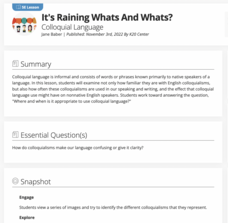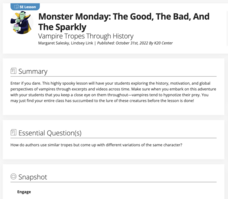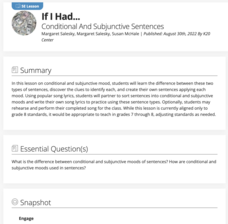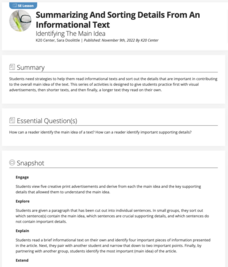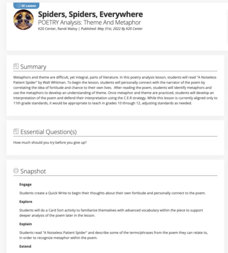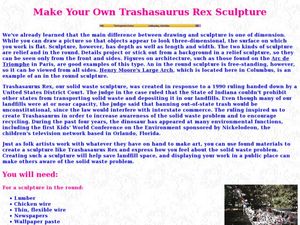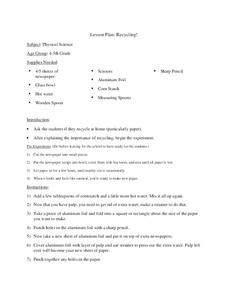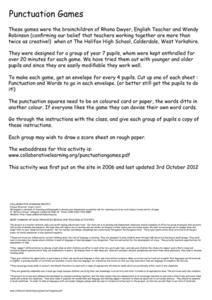K20 LEARN
Making Sense of MLA: Citing Sources and MLA Formatting
The Modern Language Association (MLA) Style Sheet is about giving credit where credit is due. And while there are different style sheets, the one most often used in Language Arts is the MLA. In this lesson, high school scholars learn how...
K20 LEARN
It’s Raining Whats and Whats? Colloquial Language
"Yuns betta outten the lights!" Colloquial language is the focus of a instructional activity that asks middle schoolers to consider the pros and cons of using idioms. They read articles, match expressions with their meaning and place of...
K20 LEARN
Monster Monday - The Good, the Bad, and the Sparkly: Vampire Tropes through History
Fangs, capes, pale skin, and beady eyes! High schoolers investigate the tropes associated with vampires by examining excerpts from stories and films. They then create a timeline that reveals how the depictions of vampires have evolved...
K20 LEARN
It’s All Greek to Me: Greek and Latin Roots
Ancient Greeks and Romans have contributed far more to modern culture than mythic heroes and stunning architecture. Greek and Latin roots are the foundation of many English words. Middle schoolers engage in an activity that asks them to...
K20 LEARN
Is Pizza Epic? Word Choice
Remember when everything was Fantastic! Fabulous! Awesome! Iconic! A series of activities encourages young writers to move beyond these overused descriptors and instead choose a more precise language.
K20 LEARN
Say It with Style: Syntax and Parallel Structure
Dr. Martin Luther King, Jr.'s "I Have a Dream" speech provides the text for a lesson plan that introduces scholars to the significance of syntax. After examining several types of clauses, phrases, and structures, class members use the...
K20 LEARN
If I Had... Conditional and Subjunctive Sentences
Lines from popular songs are used to teach middle schoolers about conditional and subjunctive moods. Groups engage in a card sort activity to identify conditional and subjective sentences and then partners draft sentences of each type....
K20 LEARN
If You Give a Mouse a Cookie: Conditional Statements
If, then, Else is not only a basic programming language command, it is also the basis for conditional statements used in writing. Middle schoolers try to craft conditional statements with a card sort activity and then collaborate on a...
K20 LEARN
Summarizing and Sorting Details from an Informational Text: Identifying the Main Idea
Scholars participate in two activities that teach them to identify the main idea and key supporting details in informational text. Partners create a visual that reflects the main idea and key supporting details in an informational text...
K20 LEARN
Spiders, Spiders, Everywhere: Poetry Analysis - Theme And Metaphor
Walt Whitman's poem "A Noiseless Patient Spider" provides high schoolers an opportunity to reflect on the importance of perseverance and fortitude. After drafting a Quick Write about a time they tried and tried again to accomplish...
K20 LEARN
Use Your Noodle: Avoiding Comma Blunders
Young grammarians will go to town with a lesson that doodles with macaroni! Scholars cook up sentences with the addition of commas, which makes all the difference in their meaning.
K20 LEARN
Rikki-Tikki-Types of Sentences: Indicative, Imperative, Interrogative Mood
Rudyard Kipling's "Rikki-Tikki-Tavi" and a song from the musical "Hamilton" allow middle schoolers to practice using punctuation to indicate whether sentences are indicative, imperative, or interrogative.
Utah Education Network (UEN)
Know Your Literature Genres
Open the library for young readers by introducing them to the main genres and sub-genres. A podcast and two presentations identify the characteristics of the different genres. Groups then sort through a box of books and, using evidence...
Curated OER
Reduce and Reuse
Students conduct a lunch waste audit by recording each item they throw away at lunch. They graph class lunch waste. They use this information to devise a plan of action to reduce lunch waste. There is also an activity to make paper.
Curated OER
A Waste Not Picture Frame
Students reuse old puzzles with missing pieces by painting the remaining pieces and using them to make a picture frame. They embellish the frame with other recycled items.
Curated OER
Are you going to eat that?
Students identify and define composting. STudents compare and contrast aerobic and anaerobic composting. Students illustrate the benefits of composting and other methods to reuse, recycle, reduce, and respond. Students identify through...
Curated OER
Make Your Own Trashasaurus Rex Sculpture
Young scholars explore environmental awareness through reusing materials. In this environmental awareness instructional activity, students use trash to create a "trashasaurus," a large dinosaur sculpture made from waste. Detailed...
Alabama Learning Exchange
Waste Not, Want Not
Pupils determine what materials are able to be recycled. In this environment protection lesson, young scholars read The Three R's: Reuse, Reduce, Recycle and discuss landfills. They are given an item to decide if it can be recycled. They...
Curated OER
Earth Day Snack Cup Project
Students plant a seed in a decorated left over yogurt cup. In this planting lesson plan, students reuse a yogurt cup that they would have thrown away, decorate it with wrapping paper, put dirt in it, and plant a seed.
Curated OER
Corn An A-Maizing Plant
Fifth graders consider the uses of corn. In this agricultural lesson, 5th graders examine corn as a natural resource and discuss the many ways to reuse the grain. A variety of activities, books, and web resources are included with the...
Curated OER
Recycling!
Learners explore environmental awareness by participating in a recycling activity. In this sustainability lesson, students identify methods in which things can be reused, such as paper. Learners utilize aluminum foil, a bowl, water,...
K12 Reader
Fix the Story with Antonyms
Readers correct a paragraph, providing antonyms for words printed in bold print so that the paragraph makes sense.
PB Works
The Cay Word Wall
Support your learners as they read The Cay by Theodore Taylor with a word wall. This resource includes 50 words from the book. All the words are printed in large font, and some of the words are paired with images.
Collaborative Learning Project
Punctuation Games
It might not be "Conjunction Junction" but your school room will rock with this punctuation game. Game rules, templates, and background information are all included in the packet.
Other popular searches
- Reduce Reuse and Recycle
- Reduce Reuse Recycle
- Reduce Reuse Recycle Lesson
- Reduce Reuse Recycle Poems
- Reuse Trash Graphing
- Reuse Recycle
- Reduce, Reuse, Recycle
- Recycle, Reuse
- Recycle, Reuse, Reduce
- Reuse Clay
- Adaptive Reuse
- Recycling:reduce, Reuse



